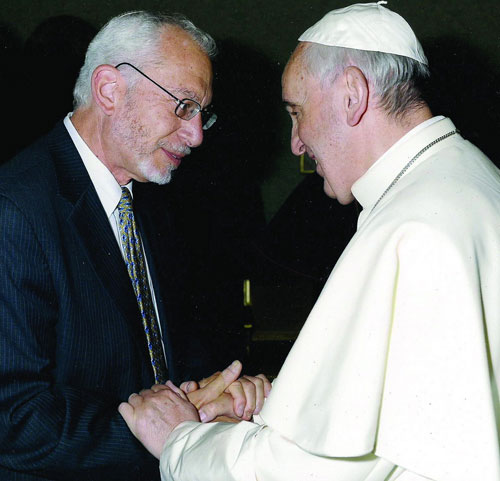.jpg)
Rome—Not many people can claim to have met with the Pope, but Bergenfield Rabbi Dr. Eugene Korn and Rabbi Shmuel Goldin from Bergen County recently traveled to Rome to meet the newly elected pope, Pope Francis, with a 28-member delegation of the International Jewish Committee on Interreligious Consultations (IJCIC), during which Pope Francis, like his role model, Pope John Paul II, solidly condemned antisemitism.
Francis says he intends to canonize Pope John Paul II, who had an excellent relationship with the Jewish people, was the first Pope in history visit a synagogue, to pray at the Western Wall and visit Yad Vashem. Pope Francis added that the Catholic Church firmly condemns hatred, persecution and all manifestations of antisemitism. He said, “Due to our common roots, a Christian cannot be antisemitic.”
The Pope, who is described as a “genuine” and “unpretentious” person, is working hard to rid the Vatican of some of its imperial symbols. He entered the room unannounced, rjecting pomp and circumstance and reflected on “the path of greater awareness and mutual understanding …strongly encouraged” by his predecessors via “significant gestures and the publication of a series of documents to deepen the thinking about theological bases of the relations between Jews and Christians…a journey for which we must surely give thanks to God.”
For 40 years, IJCIC has the Vatican’s historical and official Jewish partner in interfaith dialogue. The chairman of IJCIC and Francis both read out statements at the meeting. Afterward, the Pope spoke individually to each member of the crowd of roughly two-dozen Jewish leaders.
Rabbi Lawrence Schiffman, Provost at Yeshiva University and chairman of IJCIC, expressed gratitude for Vatican diplomatic relations with Israel and the ongoing dialogue with the Chief Rabbinate, along with relationships with international Jewish groups and the Italian Jewish community. (The new pope has already promised to visit Israel as soon as possible.)
The audience, said Schiffman, was seen as an opportunity, to “briefly sketch out and explore issues on our communal agenda and bring it to a stage of working together for common goals, too look to “future development of our relationship and the education of our communities so that nothing of that unfortunate past can ever be repeated again.”
Among the issues IJCIC members raised were that the principles of Nostra Aetate have still not been absorbed in many countries where the church is active. At the same time, Schiffman said that the Jewish community needs to continue educating its coreligionists about the changes that have taken place in the Catholic Church’s attitudes toward the Jewish people. It also means working together against all forms of religious extremism and the erosion of religious freedoms in many countries. The delegation also expressed concern about the canonization of Pope Pius XII, “while innumerable documents pertaining to the history of the Church and the Jewish people during the dark years of the Holocaust still remain closed to outside scholarly investigation.” It is hoped the full release of the much sought-after World War II documents would be kept in 2014, as promised.
Future plans of the International Liaison Committee (IJCIC plus Vatican officials) include a colloquium next October in Madrid on “Challenges to Faith in Contemporary Society” and events to take place in 2015 to celebrate the 50th anniversary of “Nostra Aetate.”
La Stampa/The Vatican Insider reported that the morning after the meeting, delegates met with Cardinal Koch and Fr. Norbert Hofmann (respectively President and Secretary of the Pontifical Commission for Religious Relations with Jews) to discuss “the mounting persecution of Christians in many countries in Africa, Asia and the Near East, where they live as minority populations. Cardinal Koch confirmed that Christians today are the most persecuted minority in the world.” Writing for the paper, Lisa Palmieri-Billig, an American Jewish Committee (AJComm) delegate and Liasion to the Holy See, observed that “Given the repeated persecutions of Jewish communities in history, this touches a sensitive chord of empathy in the Jewish psyche. The question of what can be done and whether the public expression by Jewish leaders of solidarity and outrage actually helps or hinders the security of Christians in these countries, met with contradictory assessments.”
Palmieri-Billig said that the AJComm “embraces the idea that it is always better to speak out against injustice rather than remain silent, and it acts on this premise. Together with other member organizations of IJCIC, AJC has championed reciprocal and mutual solidarity not only against antisemitism but against prejudice and persecutions of any group anywhere anytime.”
The meeting was attended by Professor Lawrence Schiffman, IJCIC Chair (Orthodox Union), Betty Ehrenberg, Vice Chair (World Jewish Congress), Martin Budd, IJCIC Treasurer (Anti-Defamation League) Rabbi David Harris of the AJComm, Rabbi Shmuel Goldin, then president of the Rabbinical Council of America and pulpit rabbi of Ahavath Torah in Englewood, Rabbi Eugene Korn, the American director of the Center for Jewish-Christian Understanding and Cooperation in Israel, founded by Rabbi Shlomo Riskin of Efrat. Rabbi Korn lives in Bergenfield (see sidebar 1) . Also in attendance were Maram Stern, WJC associate executive vice-president, Rabbi Joel Meyers, chair of the WJC American Section and Rabbi Julie Schonfeld, executive vice president of the Rabbinical Assembly.
Other AJComm delegates were David Inlander of Chicago, Chair of the Interreligious Affairs Commission; Rabbi Noam Marans of New York, Director of Interreligious and Intergroup Relations, and Rabbi David Rosen, Director of International Interreligious Affairs who said, “Pope Francis is a very good friend of the Jewish people and we rejoice in the fact that he will continue to advance the path of his predecessors in deepening the Catholic-Jewish relationship even further.”
By Jeanette Friedman (with Combined Services)











